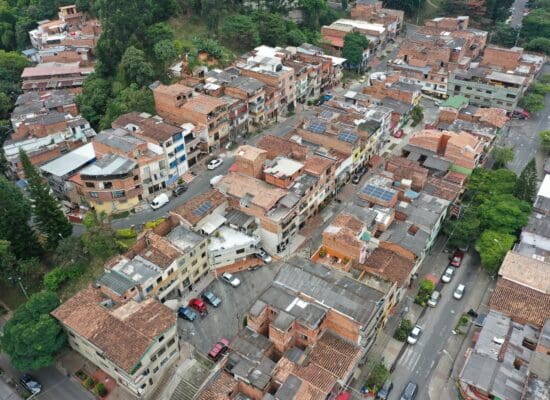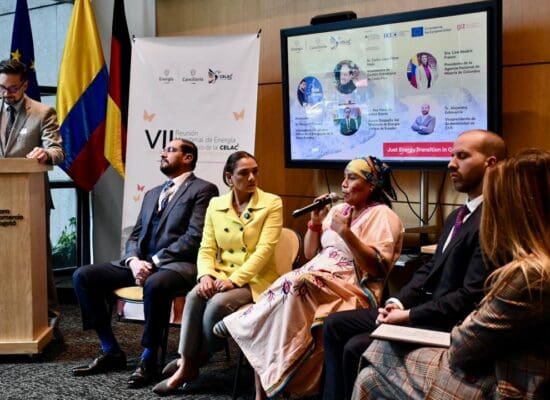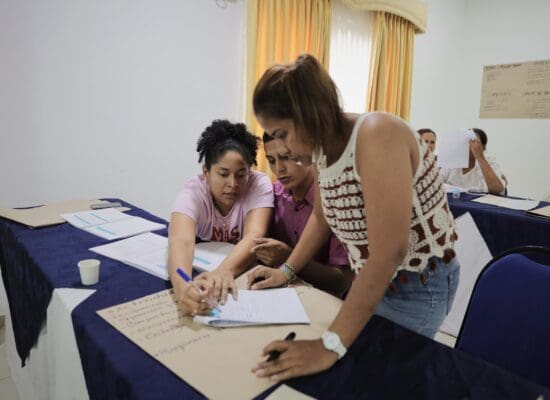News Post
Just Transition in the Colombian Railway System: Landmark event brings key stakeholders together
Country:
Colombia,
Organisation:
Corporación Trabajo Decente Colombia,
Sintravifier,
Solidarity Center,

On 30 May 2025, in the coastal city of Santa Marta, Magdalena, Sintravifer, the Solidarity Center and Corporación Trabajo Decente hosted the National Forum on a Just Transition in the Colombian Railway System, a landmark event that brought together more than 80 participants, including union members, government officials, congress representatives, and civil society organisations. Colombia’s railway system is currently underdeveloped and heavily oriented towards freight, coal transport in particular. It offers only limited passenger services and relies heavily on fossil fuel. As the country develops its climate commitments and phases out coal, momentum is growing for modernising and decarbonising the rail sector through electrification, infrastructure upgrades, and reopening key corridors. The forum was the first national event dedicated to discussing the future of the railway sector through the lens of a just eco-social transition.
Notably, participants included members of Sintravifer, the national union for the Colombian railway sector, with attendees from the departments of Magdalena, Antioquia, Santander, and Cesar, as well as leaders from other coal and energy worker unions (including Sintraelecol, Sintradrummond, SNTT, Sintracarbón, Sintrametro, and Sintramienergética), and the International Transport Workers’ Federation (ITF). Government institutions in attendance included the Ministries of Mines and Energy, Labor, and Transport; the National Infrastructure Agency (ANI); the National Infrastructure Association; and Senator Sandra Ramírez of the Senate’s Sixth Commission.

The forum agenda was structured around three key panel discussions. The first focused on the Colombian state’s perspectives, including the challenges faced and progress made in developing public and legislative policies for a just energy transition in the railway sector. The second panel explored the concept of a just transition, examining the responsibilities of the government, employers, and unions in creating spaces for social dialogue to implement these policies. The third panel provided a platform for trade unions from the railway, mining, energy, and transport sectors to share their experiences of engaging with the government, employers, and union members regarding just energy transition challenges.
The forum marked a significant milestone in Colombia’s national social dialogue on the development of the railway system. It was the first event of its kind in the country, notable for its focus on promoting understanding, reflection, debate, and coordinated action among the social actors involved in railway development. The discussions sought to identify avenues for action and exchange in pursuit of a specific transition agenda—including energy, labour, environmental, economic, and social dimensions—that would integrate rail infrastructure into national strategies for economic decarbonisation, inclusive growth, and the protection of trade union rights.

Key takeaways
- There is a need to strengthen advocacy for sustainable railway development and public dialogue between key actors, including government, private sector, and workers’ unions. Advocacy efforts should aim to promote investment projects, public-private partnerships (PPPs), and social and environmental best practices. Greater engagement would enhance opportunities for social actors, especially trade unions, to contribute proposals and initiatives to legislative processes, such as Colombian Senate Bill 232 (The Railway Law), the design of future railway PPPs, and the development of binding labour standards for workers in the sector and its supply chain.
- There are opportunities to align and coordinate union platforms and action plans for a just eco-social transition, in particular at the intersection of the transport/logistics and mining/energy sectors. These sectors are advancing increasingly comprehensive agendas that address mine closures, decarbonisation, the shift towards sustainable mobility that is less dependent on fossil fuel, and the development of a multimodal and interoperable national transport and logistics system that has rail as a core element.
- Greater employer engagement is essential, both from individual businesses units and their representative associations, in social dialogue spaces such as the one provided by the forum. This engagement is especially relevant in the context of Law 2466 of 2025, which introduces measures to manage the labour transition and productive restructuring associated with technological change and decarbonisation. The law also calls on employers to develop exit and adaptation plans aligned with these changes.
- There is a need for additional technical and academic dialogue spaces in local territories, where social actors—especially trade unions, community organisations, and civil society—can engage with the National Railway Master Plan, the Colombian government’s investment strategy for rail infrastructure, and the associated decarbonisation and transition policies.

The forum underscored the critical need for coordinated, inclusive, and forward-looking approaches to the transformation of Colombia’s railway system. As the country decarbonises and prepares for a post-coal economy, the railway sector is emerging as a strategic platform for enabling sustainable transport and regional development. A just transition in this sector will require not only infrastructure investment and technological innovation, but also strong commitments to social dialogue, labour protections, and equitable participation from communities and workers historically excluded from decision-making processes.
Looking ahead, the momentum generated by the forum provides a foundation for ongoing collaboration between trade unions, government agencies, and civil society actors. Ensuring that workers’ rights and local development priorities are central to infrastructure planning will be key to building a rail system that supports both climate goals and social justice. As new legislative proposals and investment initiatives take shape, continued spaces for dialogue, such as this national forum, will be essential to translating policy commitments into inclusive, durable outcomes on the ground.
Watch the full event recording here:
Stay Informed and Engaged
Subscribe to the Just Energy Transition in Coal Regions Knowledge Hub Newsletter
Receive updates on just energy transition news, insights, knowledge, and events directly in your inbox.


